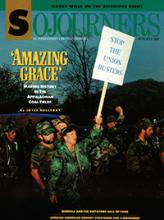For this future cultural analyst, the legendary '60s were an after-school special. And in my sprout's eye view of the world, Abbie Hoffman came on screen at the perfect time to serve as a more timely and hip successor to Mad magazine's Alfred E. Neuman.
So Hoffman, no less than Mr. Neuman, will always have a place in my heart, if only for the infamous Wall Street action. That was the one in which Hoffman and friends went to the gallery of the New York Stock Exchange and showered the trading floor with thousands of dollar bills.
As expected, the brokers made a piggish spectacle of themselves groveling for the loot. The revelatory symbolic purity of that act stands. And so does the adolescent thrill of seeing all those stuffed shirts reduced to their lowest common denominator.
When Hoffman emerged on the '60s sound stage with actions of that sort, he quickly stood out from the crowd of more "serious" anti-war spokespersons. Hoffman was different because he had a sense of humor, which always seems to be a rare commodity among world-savers.
But mostly Hoffman stood out because he was one of the very few participants in the '60s melodrama who realized at the time that he was actually playing a part in a TV show. With rock-and-roll instincts and a dash of undergrad psychology, Hoffman tried to turn the familiar devices of TV "info-tainment" into instruments of political power. For all of his subsequently honorable efforts as a community organizer, and for all his other less honorable moments, that prescient use of television will undoubtedly stand as his legacy to history.
Read the Full Article

